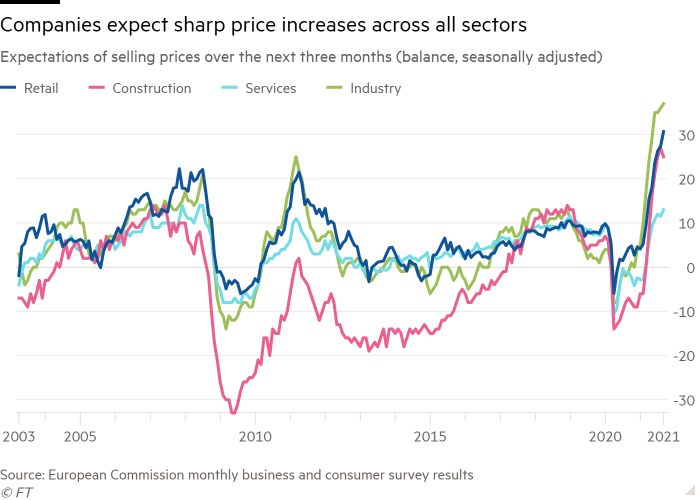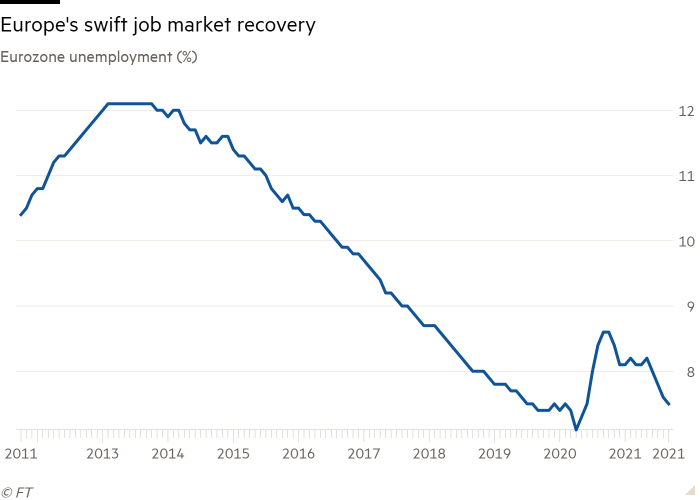Increasing numbers of German workers are demanding higher pay amid rising inflation, with some going on strike, causing economists to worry that widespread demands for higher wages could start a self-fulfilling inflationary spiral in Europe’s biggest economy.
German inflation rose to a 29-year high of 4.1 per cent in September, while in the 19-countries that share the euro it accelerated to a 13-year high of 3.4 per cent, official data showed on Friday. Lifted by soaring energy prices, that is higher than the 3.3 per cent rate expected.
Most economists believe euro area inflation will reach 4 per cent by the end of this year, twice the European Central Bank’s target, but then fade next year. That also remains the main message to date of ECB president Christine Lagarde.

However, such forecasts could prove wrong if higher prices prompt widespread wage increases that send inflation higher still.
In one example this week, workers at German motorhome maker Carthago went on strike over pay, demanding their share of the spoils from a surge in orders thanks to a pandemic-fuelled rise in “staycations”.
“Inflation in Germany keeps going up,” said Frederic Striegler, an official at the country’s biggest union, IG Metall, explaining its demand for a 4.5 per cent pay increase and extra early retirement funds for wood and plastic workers at Carthago and other companies in the Baden-Württemberg region of southern Germany.
“The motorhome industry has got so many orders and so much profits and employees just want a share of the cake,” said Striegler, adding that more strikes were planned in two weeks at makers of motorhomes and caravans, as well as furniture companies across the country.
Unions are making similar pay demands for German workers in other areas, such as banking and in the public sector. This week, retailers and mail order companies in the Hesse region agreed to raise their workers’ pay by 3 per cent this year and a further 1.7 per cent in April next year.
“The narrative that German wage settlements were well-behaved this year belongs to history,” said Carsten Brzeski, head of macro research at ING. “Latest announcements show that unions are going into upcoming negotiations with demands linked to current inflation numbers, not to inflation expectations.”

Propelling inflation higher are rising energy costs and supply chain bottlenecks which have sent shipping costs soaring and left manufacturers short of everything from steel to semiconductors. On Wednesday, Lagarde said: “How long these bottlenecks will take to fade out is a question we are monitoring very closely and this is on our radar screen.”
Another potentially inflationary factor is that unemployment continues to fall both in Germany and across Europe, and more companies are reporting labour shortages. The European Commission said the proportion of construction companies reporting that a lack of workers was limiting their activities hit a record 27 per cent in its latest survey.

The German association of freight transport and logistics companies has warned of a shortage of more than 60,000 truck drivers, which it expects to increase by 15,000 a year as more drivers retire than are trained.
However, the pay demands of German unions are still below the equivalent ones they were making before the pandemic hit, according to Allianz economist Katharina Utermöhl. who said: “We expect wage demands to remain in check for now.”
Furthermore, the country’s Kurzarbeit furlough scheme supported the wages of just under 1m people in July, but it is due to be scaled back at the end of the year. Utermöhl said this meant “the labour market’s current record recovery pace is likely to hit a speed bump in the coming months”.
As central bankers debate how “transitory” the latest surge in inflation will be, they are watching the progress of wage negotiations in Germany and elsewhere with particular interest. Lagarde has said the ECB would “look very attentively” at this, adding: “At the moment we are certainly not seeing any widespread contamination of those price increases into wages.”
"strike" - Google News
October 01, 2021 at 04:53PM
https://ift.tt/3uGgAcp
German workers strike for higher pay as eurozone inflation surges - Financial Times
"strike" - Google News
https://ift.tt/2WheuPk
https://ift.tt/2VWImBB
Bagikan Berita Ini














0 Response to "German workers strike for higher pay as eurozone inflation surges - Financial Times"
Post a Comment